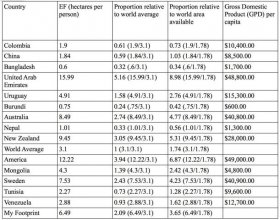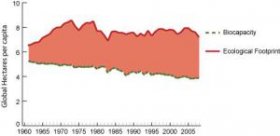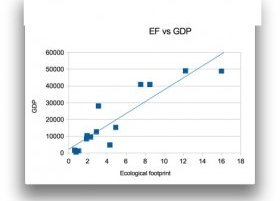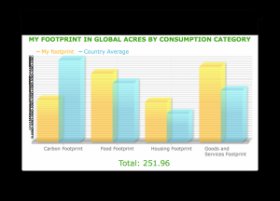Ecological myfootprint.org
 Table 1: Countries and their EF in proportion to the world average, the world area available (1), and their GDP per capita(2).
Table 1: Countries and their EF in proportion to the world average, the world area available (1), and their GDP per capita(2).
Understanding Ecological Footprint
Ecological footprint is a term that has become increasingly popular over the years as humans have started to have a more and more negative impact on the environment with their bad habits. This term is used to measure how much biologically productive land and water a person or population must be equipped with in order to withstand the impact they have on the environment as a result of their personal habits. In addition, this term also adds in how much land is needed for the person to dispose of or recycle their waste. Certain factors play in to the ecological footprint of a certain country, such as GPD and population. Countries with small populations and a low GPD per capita rate, such as Bangladesh and Nepal are more likely to have a small ecological footprint because they are not consuming resources as fast or in as great of quantities as countries with big populations. Countries with a small GDP are not using as many resources to create certain goods; therefore, their ecological footprint is smaller because of their lower rate of consumption. “Overshoot” is a term related to ecological footprint because it measures how much of Earth’s renewable resources we are depleting faster than they can be replenished. Currently humans are using renewable resources 30% faster than they can be replenished, meaning Earth can no longer sustainably support us. With the amount of resources on the Earth and the always increasing human population, there is a certain number of people that the Earth can support. This is known as “carrying capacity”, which is an approximation of the maximum population size of a species that a certain environment can sustain (3). Since the human population is increasing and we are continuing to use resources faster than they can be replenished, we are in need of major changes that will reduce our ecological footprint, bring overshoot down, and make the Earth’s carrying capacity able to support the human population. As a part of this blog I have calculated my own ecological footprint based on my personal habits, which shows that my footprint exceeds that of the world average by almost two times. This means that I have to make changes to my daily lifestyle in order for the Earth to be able to support my habits. Personally, I think that people are not aware of the impact they are having on the environment; therefore, they continue their bad habits, but if this carries on, the Earth will eventually run out of resources and we will be forced to find alternatives.
With the amount of resources on the Earth and the always increasing human population, there is a certain number of people that the Earth can support. This is known as “carrying capacity”, which is an approximation of the maximum population size of a species that a certain environment can sustain (3). Since the human population is increasing and we are continuing to use resources faster than they can be replenished, we are in need of major changes that will reduce our ecological footprint, bring overshoot down, and make the Earth’s carrying capacity able to support the human population. As a part of this blog I have calculated my own ecological footprint based on my personal habits, which shows that my footprint exceeds that of the world average by almost two times. This means that I have to make changes to my daily lifestyle in order for the Earth to be able to support my habits. Personally, I think that people are not aware of the impact they are having on the environment; therefore, they continue their bad habits, but if this carries on, the Earth will eventually run out of resources and we will be forced to find alternatives.



